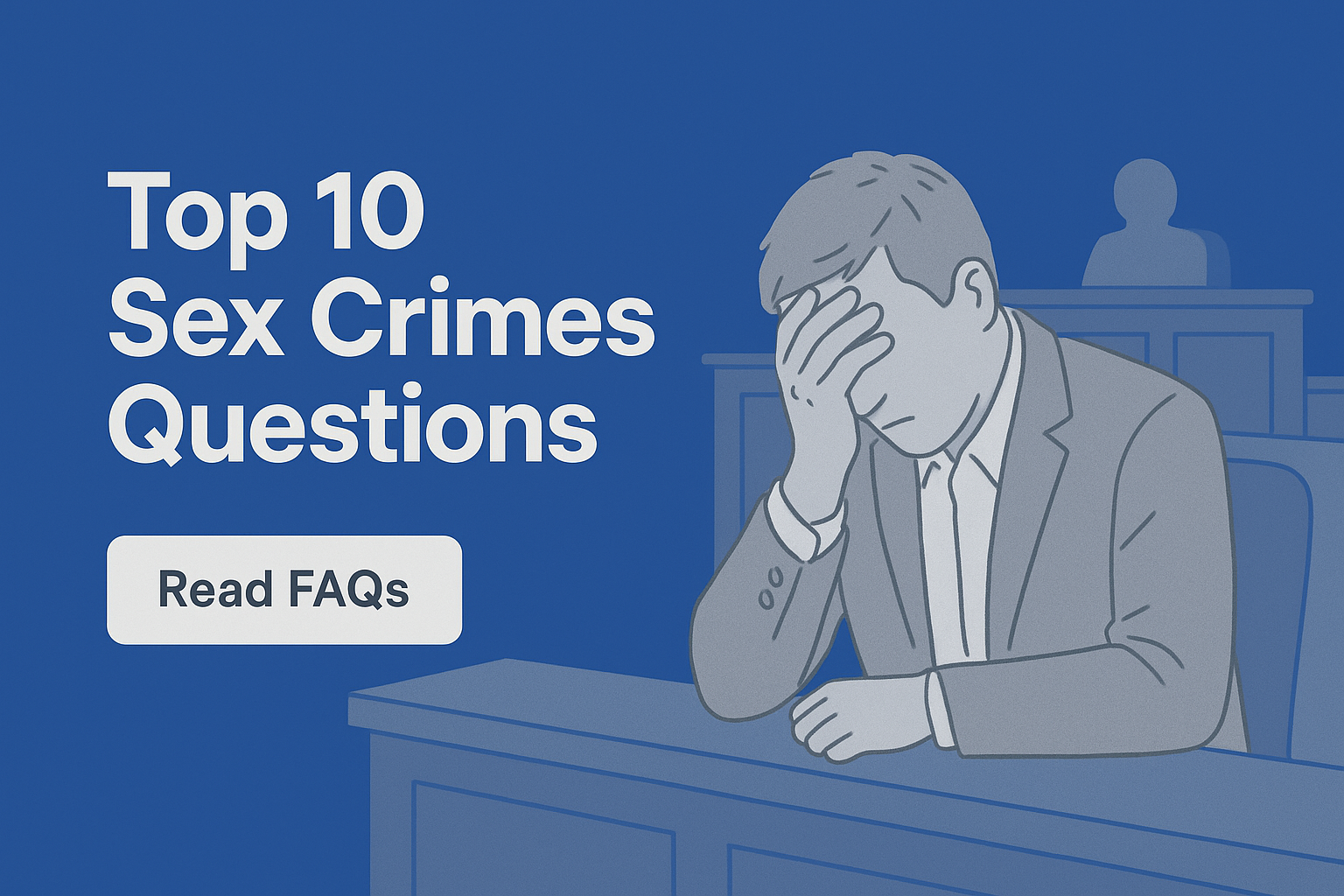Additional Links
- Criminal Lawyers With Payment Plans
- If I’m Convicted of a Sex Crime, Do I Have to Register as a Sex Offender?
- What Are the Penalties for Sexual Assault in Missouri?
- What to Do If You're Accused of a Sex Crime
- Missouri Revised Statutes
- Missouri Criminal Defense Resources
- Legal Books
- Defending Freedom Podcast
- Legal Videos

Sex Offender Registration in Missouri
Missouri’s sex offender registry was implemented under a federal law that required states to track the locations of people convicted of federal sex crimes like sex trafficking and kidnapping. This law also encompassed people court-martialed for sex crimes in the military, such as rape.
Most states, including Missouri, took advantage of the resources offered by the federal government to build registry systems that both tracked federal and state offenders.
We help people just like you when facing life-altering criminal charges. Speak to a St. Louis criminal defense lawyer today at (314) 900-HELP.

Missouri Statutes Covering Sex Offender Registry Violations
The Missouri Revised Statutes define two types of sex offender registry violations. The first type of violation occurs when an offender required to register fails to meet their legal obligations. The second type of violation happens when a sex offender violates the restrictions that come with registration.
Key laws covering these violations include the following:

Failure to Register
Missouri’s sex offender registry laws require anyone convicted of certain offenses to appear at the local police department and register within three days of being convicted, placed on probation or parole, or released from jail or prison. If they do not, they can be charged with a failure to register.
However, this failure to register law can also be used to punish other violations. Specifically, the law penalizes people required to register for a failure to “comply with any requirement” of the sex offender registry laws. Thus, prosecutors could file charges for any of the following alleged lapses:
- Failing to update the registry within three days of a change
- Providing false or incomplete information to the registering agenc
- Missing an in-person check-in to verify the information on the registry
Unfortunately, these offenses are easy to commit inadvertently. The law does not require prosecutors to prove the intent to perform these acts. Simply forgetting to take these actions can result in charges for failing to register.
Additionally, the registry requires extensive information, including:
- Address
- The names and addresses of any employers or schools
- Vehicles
- Online identifiers
If any of these details changed and you forgot to notify your local police department, you may have committed a registry offense. The most burdensome can be the online identifiers. Any time you sign up for a new email address or social media account, you must update the registry or risk charges.
Finally, the law requires regular check-ins to verify the information. The time between check-ins depends on the tier of the offense, with the highest tier requiring quarterly check-ins, the middle tier requiring semi-annual check-ins, and the lowest tier requiring annual check-ins. Prosecutors can charge you for missing a check-in, regardless of the reason.
Residing Near a Childcare Facility, School, or Victim
A subset of registered offenders cannot reside within 1,000 feet of any of the following:
- Public or private school that includes classes up to 12th grade
- Licensed or exempt childcare facility
- A victim
Certain sex crimes fall under this restriction.
In Missouri, these crimes generally include:
- Incest
- First-degree endangering the welfare of a child
- Use of a child in a sexual performance
- Promoting a sexual performance by a child
- Sexual exploitation of a minor
- Promoting or possessing child pornography
- Furnishing pornographic material to minors
This law also applies to anyone convicted in other jurisdictions of equivalent offenses.
Being Present Near a Childcare Facility
Anyone convicted of these offenses also cannot be present or loiter within 500 feet of the grounds or buildings of a licensed or exempt childcare facility when children under 18 are present. The law does not define loitering, but it is typically understood as being present without a legitimate purpose.
Being Present Near a School
A similar restriction applies to people convicted of those same offenses to being present or loitering within 500 feet of a school building, school grounds, or property where a school activity is being held when children under 18 are present. This offense can occur even if the person is unaware that they are within 500 feet of the location.
Loitering Near Certain Facilities
Additionally, convicted individuals cannot loiter within 500 feet of any of these facilities:
- Public park with playground equipment
- Public swimming pool, athletic complex, or athletic fields primarily for children
- Museums primarily for children under 18
- Nature or education centers affiliated with the Missouri Department of Conservation
This offense can occur even if there are no children under 18 present at the facility.
Acting as a Coach or Employer
Convicted individuals cannot act as coaches, managers, or trainers for sports teams with members under 17. Separately, they are not allowed to supervise or hire any child under 18.
Violating Halloween Restrictions
All registrants, regardless of their offense, must do the following on Halloween:
- Avoid Halloween-related contact with children, specifically trick-or-treaters
- Remain inside their residence from 5 p.m. to 10:30 p.m.
- Turn off all outdoor lights after 5 p.m.
The statute does not define “Halloween-related” contact. In the absence of a definition, this violation could include Halloween parties and festivals where children are present.
Defenses for Charges Alleging Sex Offender Registry Violations in St. Louis
Despite their breadth, you have defenses you can raise against sex offender registry violations. The criminal defense strategy your lawyer designs will depend on the facts and circumstances of your case. Some possible defenses include:
Statutory Exception
Several registry violations provide exceptions. For example, parents are allowed in and near childcare facilities. Similarly, if you established your residence before a school opened within 1,000 feet, you can remain there if you notify the local sheriff’s office with proof that you lived there first.
Permission
Some registry laws allow officials to consent to the registrant’s presence. For instance, the superintendent or school board can consent to a parent’s presence on school grounds or at school activities. A state nature or education center can also consent to a registrant’s presence on their property.
Impossibility and Necessity
You might be able to argue impossibility as a defense against certain offenses. An example would be that you cannot go to your registry check-in if you are in the hospital.
Likewise, necessity might provide a defense to certain restrictions. If you had to pick up your injured child, you may have been required to enter school grounds.































